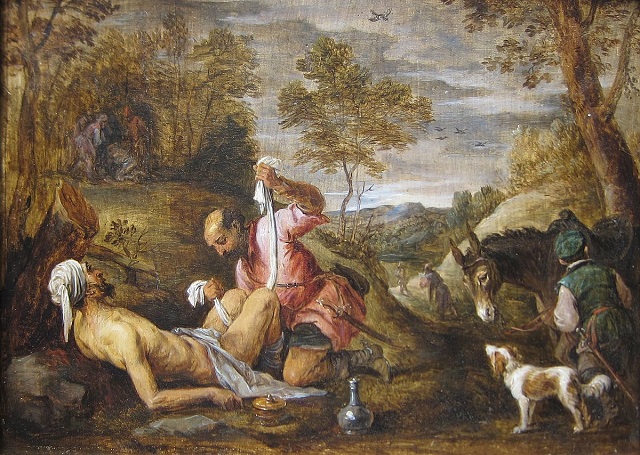The Armenian Weekly. Today in a world of new reality, we have started to look at our surroundings more closely than ever before. We are more appreciative of our police officers, nurses, doctors and emergency caregivers. We began understanding the hardship our teachers were going through teaching our kids. We started realizing that we are social beings with people around us. And we started asking, “Who is my neighbor?” If we are asking, we are not the first. In fact, the first to ask that question was a teacher of the law that we read in the Gospel of Luke 10:29.
Jesus never answered his question. Instead he told the parable of the Good Samaritan.
The parable of the Good Samaritan is one of the most famous stories in the Bible. Today, even when people do not open their Bibles, it is noteworthy that one researcher found that 50 percent of those interviewed said they could tell the story if they wanted to. People may or may not tell the story, but the idea of ”Good Samaritan” is dear to everybody. In his honor we are called hospitals and institutions all over the world.
Most people know “Good Samaritan” when they see a policeman or firefighter coming to their rescue, and in particular, anonymous people who stop to change the tire of a driver in difficulty or help a blind person cross the street.
To understand who Jesus is referring to in the parable, I want us to consider four characters:
1. In verse 30 we see an injured man. It is written:
A man was coming down from Jerusalem to Jericho. He fell into the hands of thieves, who robbed him, stripped him of his clothes, wounded him, and left him half-dead.
Traveling in some parts of Palestine during Jesus’ days was dangerous and especially the road from Jerusalem to Jericho.
2. In verses 31 and 32, Jesus tells of two passers-by.
The first one seeing the wounded goes off the road. The second one also changes his way and goes away. One thing is clear, both of them do nothing for the wounded man.
3. In verses 33 through 35, Jesus tells of a rescuer.
A Samaritan passing by sees the wounded man and has compassion on him. Says the Lord:
Let’s describe what the Samaritan did:
First and foremost, “Good Samaritan” had compassion on this man. This is the key to this parable and the immediate cause of everything.
Second, he went toward the injured. The others went across the road to avoid. The Good Samaritan was not ashamed, frightened or worried about what people might think about this help.
Third, he took care of the wounds with oil and wine.
Fourth, the “Good Samaritan” put the man on his animal, which means he had to walk the rest of the journey.
Fifth, he took the wounded to an inn.
Sixth, he took care of him all night.
Finally, he gave the housekeeper money for room and care until the man was recovered. He promised that if there were any additional expenses, he would pay on his return.
Giving such praise to the Samaritans was unacceptable by the Jews, and most of the listeners of the Lord would certainly rather die than receive help from the Samaritans.
Now we return to our inquiry: who is our neighbor, and how should we love our neighbor?
Our friend is the one in need, whether we are like him or not.
But HOW should we love our neighbor? The parable of the Good Samaritan gives the answer in four words.
First, is the word COMPASSION. We must be compassionate and caring.
Second, is the word ACT. Luke tells that the Samaritan went to the wounded man, not away like other passers-by.
Third is the word CARE. He did what he could to help him. He couldn’t do everything; he was not a doctor and he had no experience in the field of medicine. Even his time was limited. We do not know why he could no longer stay to help the man. He had other urgent needs. But he did what he could… and that was enough.
The last is the word Cost. To help this wounded victim, the Samaritan paid with his time and money. Love is never without cost. There is a time cost and often there is a financial cost. By nature, love is sacrificial.
Today, more than ever, there is a need for “Good Samaritans” when people need others who will support them. The number of people infected with the coronavirus has risen sharply requiring primary care, be it from doctors, paramedics or emergency workers.
There are many who have lost their jobs, those who have lost their homes, those who have lost a family member, and those who are in a difficult financial situation, for whom a “good samaritan” can have a positive impact.
May we also strive to love God with all our heart, soul and mind. Love our neighbor as our own. When this week gives us a chance to love someone, let’s take the opportunity. Let us show genuine compassion. Let us draw near to the needy, not shy away from them, and take care of the needs if we are able and willing to pay with some of our expenses and time.
May God through His Son, enter our houses bringing with Him patience, so we may survive this epidemic, courage to inspire others, love to follow in the footsteps of the Lord and the faith of our forefathers who endured tribulations. Amen.
Archpriest Fr. Daron Stepanian
Caption: The Good Samaritan by David Teniers the Younger

























































